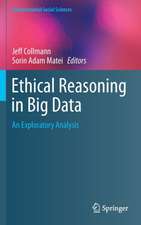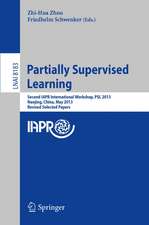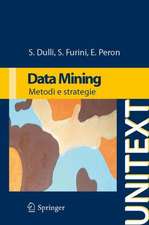Big Data Factories: Collaborative Approaches: Computational Social Sciences
Editat de Sorin Adam Matei, Nicolas Jullien, Sean P. Gogginsen Limba Engleză Paperback – 30 aug 2018
The book proposes a systematic approach to big data collection, documentation and development of analytic procedures that foster collaboration on a large scale. This approach, designated as “data factoring” emphasizes the need to think of each individual dataset developed by an individual project as part of a broader data ecosystem, easily accessible and exploitable by parties not directly involved with data collection and documentation. Furthermore, data factoring uses and encourages pre-analytic operations that add value to big data sets, especially recombining and repurposing.
Finally, the book presents the teaching utility of data factoring and the ethical and privacy concerns related to it.
Chapter 9 of this book is available open access under a CC BY 4.0 license at link.springer.com
| Toate formatele și edițiile | Preț | Express |
|---|---|---|
| Paperback (1) | 204.81 lei 38-44 zile | |
| Springer International Publishing – 30 aug 2018 | 204.81 lei 38-44 zile | |
| Hardback (1) | 241.67 lei 6-8 săpt. | |
| Springer International Publishing – 7 dec 2017 | 241.67 lei 6-8 săpt. |
Din seria Computational Social Sciences
- 15%
 Preț: 649.39 lei
Preț: 649.39 lei - 18%
 Preț: 964.54 lei
Preț: 964.54 lei - 15%
 Preț: 643.34 lei
Preț: 643.34 lei - 15%
 Preț: 640.88 lei
Preț: 640.88 lei - 20%
 Preț: 338.16 lei
Preț: 338.16 lei -
 Preț: 390.63 lei
Preț: 390.63 lei -
 Preț: 395.47 lei
Preț: 395.47 lei - 20%
 Preț: 662.11 lei
Preț: 662.11 lei - 20%
 Preț: 618.06 lei
Preț: 618.06 lei - 20%
 Preț: 760.97 lei
Preț: 760.97 lei - 20%
 Preț: 628.80 lei
Preț: 628.80 lei - 20%
 Preț: 649.93 lei
Preț: 649.93 lei - 20%
 Preț: 761.44 lei
Preț: 761.44 lei - 15%
 Preț: 643.48 lei
Preț: 643.48 lei - 18%
 Preț: 1117.34 lei
Preț: 1117.34 lei - 20%
 Preț: 1169.47 lei
Preț: 1169.47 lei -
 Preț: 432.12 lei
Preț: 432.12 lei -
 Preț: 393.13 lei
Preț: 393.13 lei - 18%
 Preț: 887.38 lei
Preț: 887.38 lei -
 Preț: 383.93 lei
Preț: 383.93 lei - 20%
 Preț: 241.67 lei
Preț: 241.67 lei - 15%
 Preț: 523.07 lei
Preț: 523.07 lei -
 Preț: 428.07 lei
Preț: 428.07 lei - 15%
 Preț: 693.06 lei
Preț: 693.06 lei -
 Preț: 487.75 lei
Preț: 487.75 lei - 20%
 Preț: 1166.19 lei
Preț: 1166.19 lei - 15%
 Preț: 696.02 lei
Preț: 696.02 lei - 20%
 Preț: 1156.62 lei
Preț: 1156.62 lei - 25%
 Preț: 470.32 lei
Preț: 470.32 lei
Preț: 204.81 lei
Preț vechi: 256.01 lei
-20% Nou
Puncte Express: 307
Preț estimativ în valută:
39.19€ • 42.56$ • 32.92£
39.19€ • 42.56$ • 32.92£
Carte tipărită la comandă
Livrare economică 19-25 aprilie
Preluare comenzi: 021 569.72.76
Specificații
ISBN-13: 9783319865645
ISBN-10: 3319865641
Pagini: 141
Ilustrații: VI, 141 p. 18 illus., 14 illus. in color.
Dimensiuni: 155 x 235 mm
Ediția:Softcover reprint of the original 1st ed. 2017
Editura: Springer International Publishing
Colecția Springer
Seria Computational Social Sciences
Locul publicării:Cham, Switzerland
ISBN-10: 3319865641
Pagini: 141
Ilustrații: VI, 141 p. 18 illus., 14 illus. in color.
Dimensiuni: 155 x 235 mm
Ediția:Softcover reprint of the original 1st ed. 2017
Editura: Springer International Publishing
Colecția Springer
Seria Computational Social Sciences
Locul publicării:Cham, Switzerland
Cuprins
Chapter1. Introduction.- Part 1: Theoretical Principles and Approaches to Data Factories.- Chapter2. Accessibility and Flexibility: Two Organizing Principles for Big Data Collaboration.- Chapter3. The Open Community Data Exchange: Advancing Data Sharing and Discovery in Open Online Community Science.- Part 2: Theoretical principles and ideas for designing and deploying data factory approaches.- Chapter4. Levels of Trace Data for Social and Behavioral Science Research.- Chapter5. The 10 Adoption Drivers of Open Source Software that Enables e-Research in Data Factories for Open Innovations.- Chapter6. Aligning online social collaboration data around social order: theoretical considerations and measures.- Part 3: Approaches in action through case studies of data based research, best practice scenarios, or educational briefs.- Chapter7. Lessons learned from a decade of FLOSS data collection.- Chapter8. Teaching Students How (NOT) to Lie, Manipulate, and Mislead with Information Visualizations.- Chapter9. Democratizing Data Science: The Community Data Science Workshops and Classes.
Notă biografică
Sorin Matei is a Professor at Brian Lamb School of Communication at Purdue University. His focus areas are computational social science, collaborative content production, and data storytelling.
Nicolas Jullien is an Associate Professor at the LUSSI Department of Telecom Bretagne. His research interests are in open and online communities.
Sean Patrick Goggins is an Associate Professor at Missouri's iSchool, with courtesy appointments as core faculty in the University of Missouri's Informatics Institute and Department of Computer Science.
Textul de pe ultima copertă
The book proposes a systematic approach to big data collection, documentation and development of analytic procedures that foster collaboration on a large scale. This approach, designated as “data factoring” emphasizes the need to think of each individual dataset developed by an individual project as part of a broader data ecosystem, easily accessible and exploitable by parties not directly involved with data collection and documentation. Furthermore, data factoring uses and encourages pre-analytic operations that add value to big data sets, especially recombining and repurposing.
Finally, the book presents the teaching utility of data factoring and the ethical and privacy concerns related to it.
Chapter 9 of this book is available open access under a CC BY 4.0 license at link.springer.com
Caracteristici
Provides basic researchers and practitioners direct guidelines and best case scenarios for developing activities related to data factoring Presents methods for teaching data factoring Proposes a set of principles for developing data factoring


























